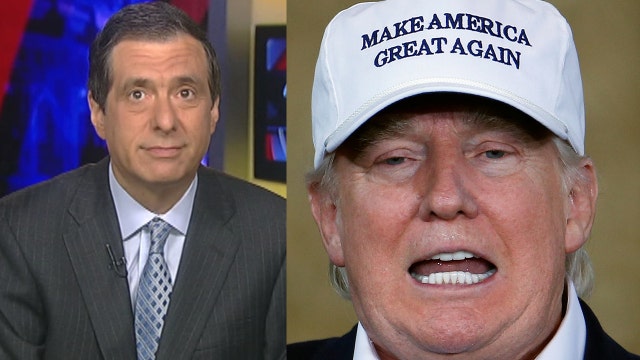Kurtz: Has coverage of Trump turned crazy
'MediaBuzz' host Howard Kurtz weighs in on the media not criticizing David Plouffe calling Donald Trump a 'psychopath'
Last week we had Donald Trump and Hillary Clinton accusing each other of racism and bigotry.
We just kicked off this week with Trump being denounced as a “psychopath.” And not by some random blogger, but by President Obama’s former campaign manager.
David Plouffe said on “Meet the Press”: "I mean, basically, we have a psychopath running for president. I mean, he meets the clinical definition, okay."
Chuck Todd, to his credit, pushed back, questioning whether such on-air medical analysis was fair and saying this is the kind of rhetoric that alienates voters.
Plouffe doubled down, speaking of "the grandiose notion of self-worth, pathological lying, lack of empathy and remorse." He conceded, though, that "I don't have a degree in psychology."
So I didn’t see any stories yesterday examining whether Plouffe had gone too far, or whether Clinton needed to distance herself from that kind of criticism. It was just reported as another campaign slam. That’s because some people in the media business essentially agree with Plouffe’s diagnosis. MSNBC’s Mika Brzezinski yesterday called for a psychiatrist should evaluate Trump. (Trump, in turn, has called her “crazy” and “neurotic.”)
Now all the Trump-haters are going to fire up the Twitter and say, what’s wrong with you, of course Trump is crazy, why can’t you see that?
I don’t raise these questions because I’m for or against Trump, but because I believe similar standards should be applied to both candidates. I went on the air and criticized some on the right for pushing phony theories about Hillary’s health.
Sometimes, Trump gives his detractors ammunition. The latest example came after the tragic fatal shooting of the cousin of NBA star Dwyane Wade.
After the news was reported, Trump tweeted this:
“Dwyane Wade's cousin was just shot and killed walking her baby in Chicago. Just what I have been saying. African-Americans will VOTE TRUMP!”
Did he seem to be using a personal tragedy for political purposes? Yes. And those who called it insensitive had every right to feel that way.
This was followed by a second tweet—the kind of message that politicians usually offer:
“My condolences to Dwyane Wade and his family, on the loss of Nykea Aldridge. They are in my thoughts and prayers.”
Campaign manager Kellyanne Conway didn’t attempt to defend Trump’s first tweet on television Sunday. She simply said she was glad he posted the second one.
When pundits call Trump “crazy,” as Washington Post columnist Gene Robinson did recently, I have to ask: How did a guy with so many screws loose win the Republican nomination?
And what does it say about the voters who support Trump if the tone of media coverage is so antagonistic toward him? Even if Trump is down 3 to 6 points in general-election polls, that means many millions of Americans, at the moment, still plan to vote for him.
Occasionally we see signs of balance. After a week of media scrutiny over whether Trump “flip-flopped” on mass deportations—a perfectly fair question—the Washington Post yesterday examined why Clinton refused for years to support same-sex marriage despite strong relations with gay rights advocates. That’s generally been described as an evolution, rather than a flip-flop.
This is not about false equivalence. If Trump makes more inflammatory comments than Clinton, those will rightly draw more scrutiny. But the media should strive to be even-handed when it comes to the tone of coverage for both candidates.
Not doing so would be crazy.









































